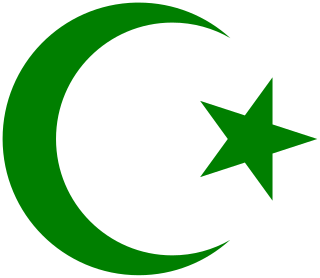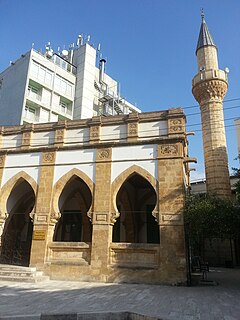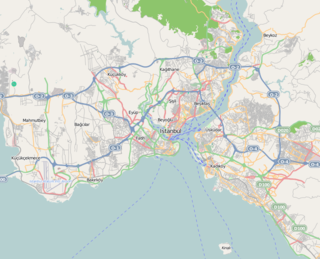
Owing to labour migration in the 1960s and several waves of political refugees since the 1970s, Islam has become a visible religion in Germany. A representative survey estimated that in 2019, there were 5.3–5.6 million Muslims with a migrant background in Germany, in addition to an unknown number of muslims without a migrant background. A previous, similar survey in 2016 estimated a number of 4.4–4.7 million Muslims with a migrant background at that time. An older survey in 2009 estimated a total number of up to 4,3 Muslims in Germany at that time. There are also higher estimates: according to the German Islam Conference, Muslims represented 7% of the population in Germany in 2012.

Islam is the most practiced religion in Turkey. The established presence of Islam in the region that now constitutes modern Turkey dates back to the later half of the 11th century, when the Seljuks started expanding into eastern Anatolia.

In Turkey, the Directorate of Religious Affairs is an official state institution established in 1924 under article 136 of the Constitution of Turkey. It is a successor to the Shaykh al-Islām, after the abolition of the Ottoman Caliphate.

The Turkish-Islamic Union for Religious Affairs is one of the largest Islamic organisations in Germany. Founded in 1984 as a branch of the Presidency of Religious Affairs in Ankara, it is an "arm" of the Turkish state. The headquarters are in Cologne-Ehrenfeld.

Ali Bardakoğlu served as the president of the Presidency of Religious Affairs of Turkey between 2003 and 2010.

Millî Görüş is a religious-political movement and a series of Islamist parties inspired by Necmettin Erbakan. It has been called one of "the leading Turkish diaspora organizations in Europe" and also described as the largest Islamic organization operating in the West. Founded in 1969, the movement claimed to have "87,000 members across Europe, including 50,000 in Germany," as of 2005. The term also refers to the "religious vision" of the organization that emphasizes the moral and spiritual strength of Islamic faith (iman) and explains the Muslim world's decline as a result of its imitation of Western values and inappropriate use of Western technology. The Movement is active in nearly all European countries and also countries like Australia, Canada and the United States.

Secularism in Turkey defines the relationship between religion and state in the country of Turkey. Secularism was first introduced with the 1928 amendment of the Constitution of 1924, which removed the provision declaring that the "Religion of the State is Islam", and with the later reforms of Turkey's first president Mustafa Kemal Atatürk, which set the administrative and political requirements to create a modern, democratic, secular state, aligned with Kemalism.

Islam is the largest religion in Turkey according to the state, with 99.9% of the population being initially registered by the state as Muslim, for anyone whose parents are not of any other officially recognised religion and the remaining 0.1% are Christians or adherents of other officially recognised religions like Judaism. Due to the nature of this method, the official number of Muslims include people with no religion; converted people and anyone who is of a different religion from their Muslim parents, but has not applied for a change of their individual records. The records can be changed or even blanked on the request of citizen, by filing an e-government application since May 2020, using a valid electronic signature to sign the electronic application. Any change in religion records additionally results in a new ID card being issued. Any change in religion record also leaves a permanent trail in the census record, however, record of change of religion is not accessible except for the citizen in question, next-of-kin of the citizen in question, the citizenship administration and courts.
Turks in the Netherlands refers to people of full or partial Turkish ethnicity living in the Netherlands. They form the largest ethnic minority group in the country; thus, the Turks are the second-largest ethnic group in the Netherlands after the ethnic Dutch. The majority of Dutch Turks descend from the Republic of Turkey; however, there has also been significant Turkish migration waves from other post-Ottoman countries including ethnic Turkish communities which have come to the Netherlands from the Balkans, the island of Cyprus, as well as from other parts of the Levant. More recently, during the European migrant crisis significant waves of Turkish minorities from Syria and Kosovo have also arrived in the Netherlands. In addition, there has been migration to the Netherlands from the Turkish diaspora; many Turkish-Belgians and Turkish-Germans have arrived in the country as Belgian and German citizens.

The Cologne Central Mosque is a building commissioned by German Muslims of the Organization DITIB for a large, representative Zentralmoschee in Cologne, Germany. This mosque was inaugurated by Turkish President Erdogan. After controversy, the project won the approval of Cologne's city council.
Baba Ishak, also spelled Baba Ishāq, Babaî, or Bābā’ī, a charismatic preacher, led an uprising of the Turkoman of Anatolia against the Seljuq Sultanate of Rûm well known as Babai Revolt c. 1239 until he was hanged in 1241.
Turks in Denmark, also referred to as Turkish Danes or Danish Turks refers to ethnic Turkish people living in Denmark. They currently form the largest ethnic minority group in the country; thus, the Turks are the second largest ethnic group in Denmark, after the ethnic Danish people. The majority of Danish Turks descend from the Republic of Turkey; however, there has also been significant Turkish migration from other post-Ottoman countries including ethnic Turkish communities which have come to Denmark from the Balkans, the island of Cyprus, and more recently Iraq and Syria.
Turks in Switzerland, also referred to as Swiss Turks and Turkish Swiss people, are Swiss residents of Turkish origin. The majority of Swiss Turks descend from the Republic of Turkey; however there has also been Turkish migration waves from other post-Ottoman countries including ethnic Turkish communities which have come to Switzerland from the Balkans, the island of Cyprus, and more recently Iraq and Syria.

Mehmet Görmez is the former President of the Presidency of Religious Affairs and as such legally the highest level Islamic scholar in Turkey and the Turkish Republic of Northern Cyprus.

Diyanet Center of America (DCA) is a non-profit organization funded by the Turkish government that is based in Lanham, Maryland, serving the needs of the Muslim community in the Washington Metropolitan Area. The center holds regular Friday congregational prayers, Ramadan dinners, religious holiday celebrations – including Mawlid – and various other social, cultural, and religious activities.

Sarayönü Mosque, also known as the Mosque of the Serai, is a mosque in the walled city of Nicosia, Cyprus, currently located in North Nicosia. It is very close to the Sarayönü Square and has historically been on the square.

Bayraktar Mosque is a mosque in Nicosia, Cyprus, currently placed in the southern sector of the city administered by the Republic of Cyprus.

Ömeriye Mosque, is a mosque in the walled city of Nicosia on the island of Cyprus, currently located in the south section of Nicosia. Following the Turkish invasion of Cyprus, the mosque gained significance as one of the most important sites of Muslim worship in the non-Muslim section of the island and the city.

Hırka-i Şerif Mosque is a historic mosque in Istanbul, Turkey. It takes its name from a relic, the mantle of Muhammad, which is preserved in the mosque.

















